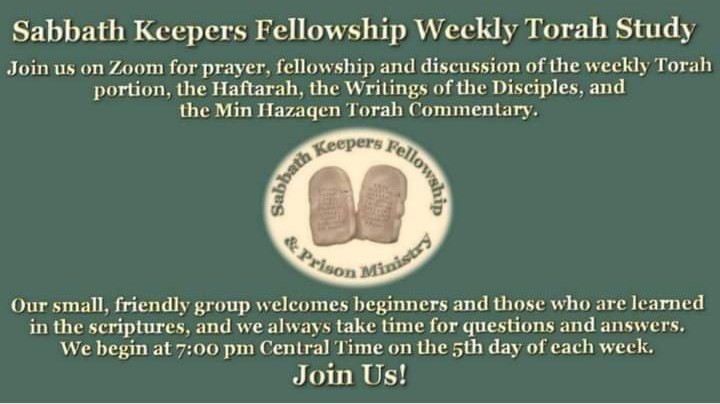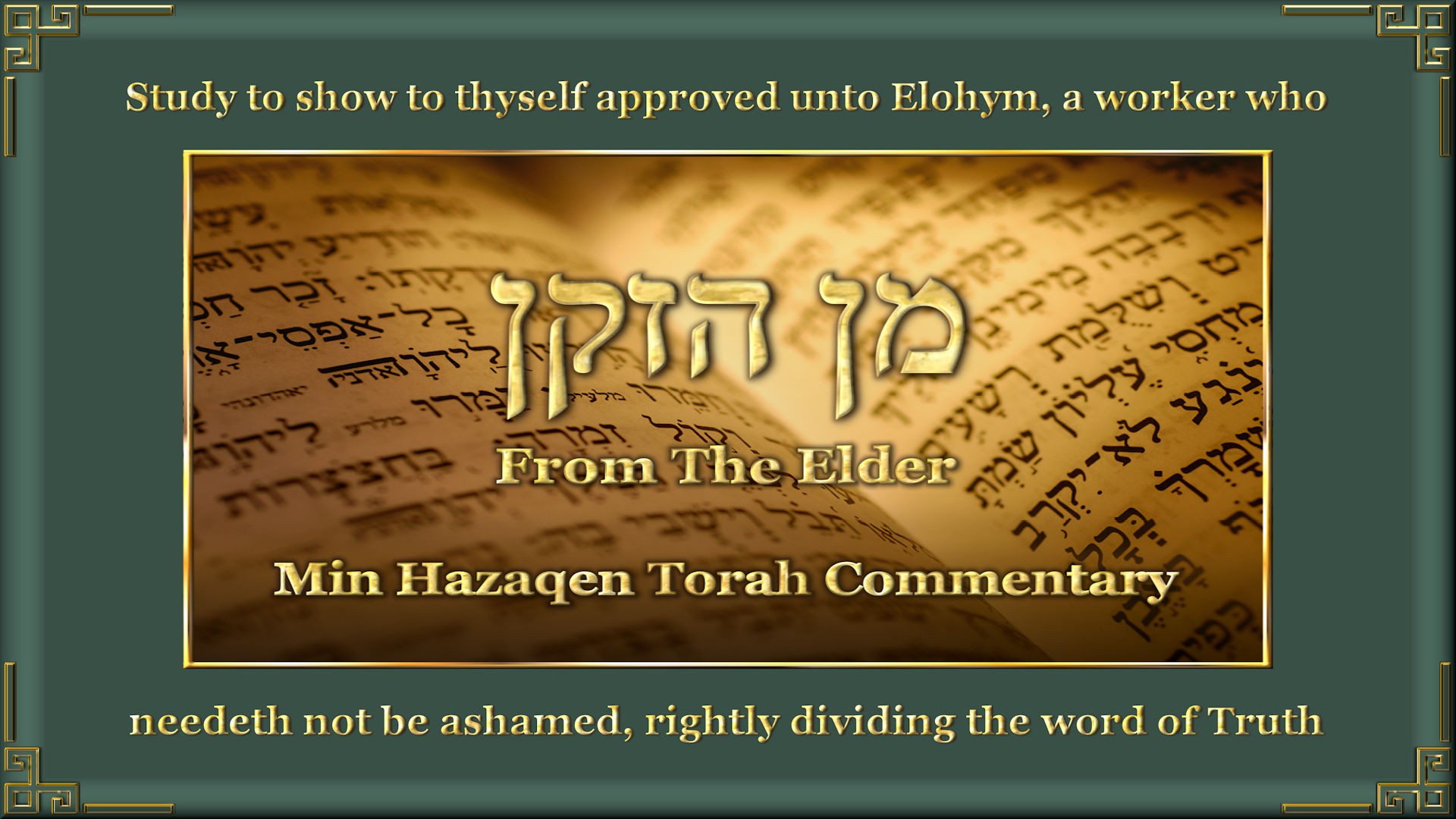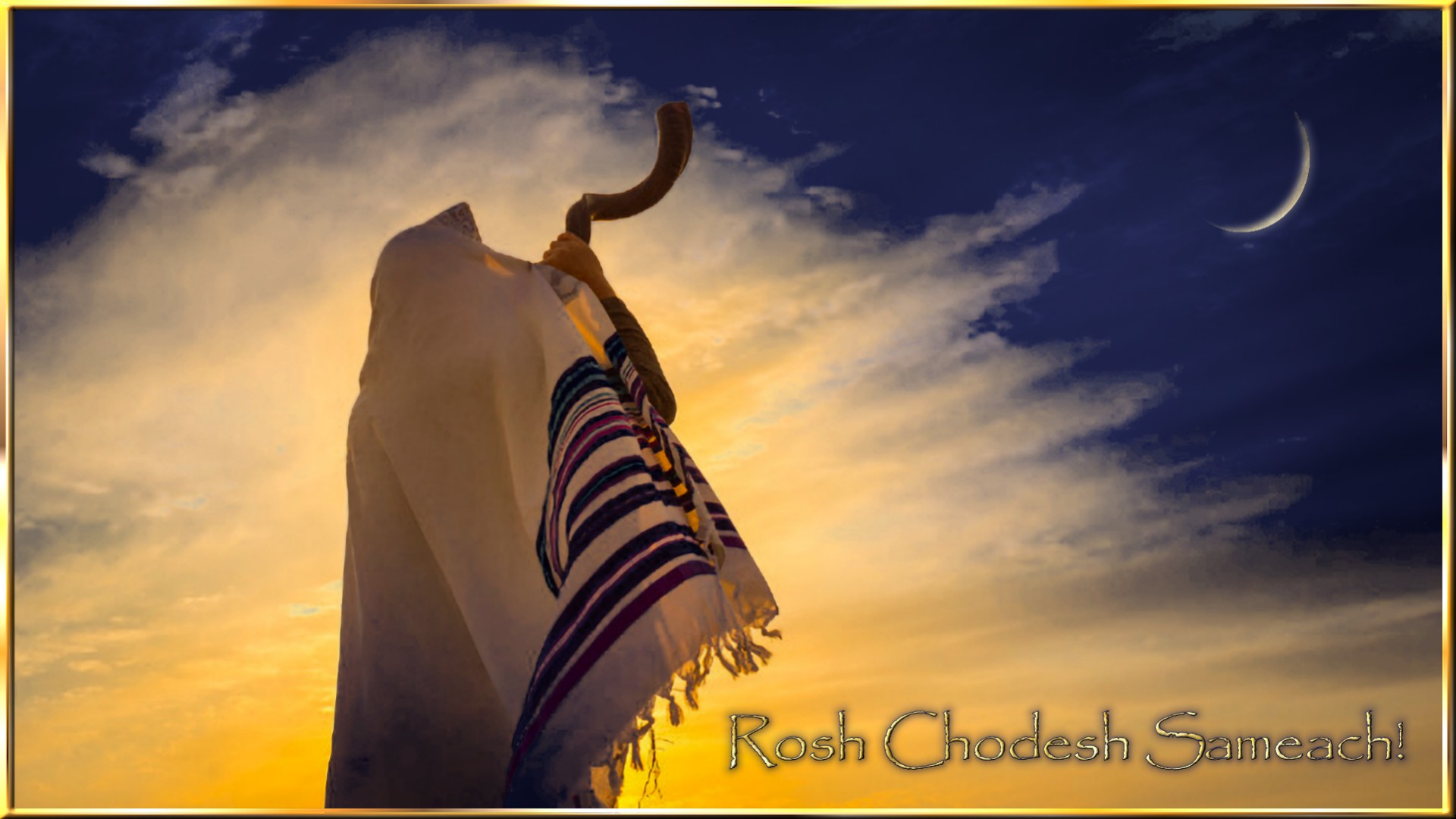Watch
Events
Articles
Market
More
Ovadyah Ben Yisrael
Sabbath Keepers Fellowship Weekly Torah Study
Join us on Zoom for prayer, fellowship and discussion of the weekly Torah portion, the Haftarah, the Writings of the Disciples, and the Min Hazaqen Torah Commentary.
Our small, friendly group welcomes beginners and those who are learned in the scriptures, and we always take time for questions and answers.
We begin at 7pm Central Time on the 5th day of each week. Here is the link:
https://us06web.zoom.us/j/4731209848
Join Us!




Do you have a relationship with your church? You minister? You should and the Torah groups set a good example for this!
https://firstcenturychristiani....ty.net/do-you-have-a



Selichoth Prayers - An Introduction
"Then you will call upon Me and come and pray to Me, and I will listen to you.
And you will seek Me and find Me, when you search for Me with all your heart."
Tephillah is the act of prayer. It is the way that we communicate with the Most High. The word tephillah in Hebrew connotes much more than just communication, it implies an actual attachment with that object to which it is directed, or a reattachment of that which has been torn asunder. That is the goal of Selichoth prayers.
Selichoth means “forgivenesses.” Each year as we perform the annual cycle of festivals, fasts and commandments of YHWH, we are meant to ascend ever higher towards understanding, righteousness and perfection. Each year we try with all or most of our hearts to do this, and yet each year we somehow fail. Then, if we are honest with ourselves, we experience a dread at the onset of Yom Teruah and the Days of Judgment. Selichoth prayers are appeals to YHWH for His forgiveness of our failings which are said during the month of Elul, including the entire forty days prior to Yom Hakippurym, in an attempt to reconcile ourselves with Him.
Elul, the sixth scriptural month, is the month of “Repentance and Return.” Each day of Elul, the shofar is blown to awaken the people of YHWH from their spiritual slumber, to warn them of the impending coming of Messiah, and to cause them to repent of their many sins. But repentance without a return to righteousness is a vain thing. Return, or “Teshuvah,” is the object of Selichoth prayers. Each morning during Elul, we rise and pour out our hearts before our Creator in hopes that He will hear and quickly restore us to right-standing with Him before He comes.
There is scriptural precedent for Selichoth prayer. It was during the month of Elul that Moshe returned to Mount Sinai for forty days and nights to obtain the second set of tablets, after breaking the first ones because of the sin of the golden calf. It is thought that the children of Yisrael prayed and fasted during this time of waiting. It was prior to the fall festival that Sh’lomo dedicated the first temple with his famous prayer, asking that YHWH hear and forgive His people their sins wherever they might be, when they turn toward His house and pray to Him with all their hearts. And it was during the month of Elul that Yehoshua Hamashiach prayed, fasted and was tested in the wilderness prior to the beginning of His ministry on earth.
It is not enough to wait until the day of His return, and then plead for forgiveness in Judgment - not for His Remnant, those who will be His at His coming. Like the parable of the Ten Virgins, we must be of those who do not slumber, but remain awake and vigilant, ready and waiting for our Savior’s return. It is to that end that Sabbath Keepers Fellowship is posting this article and presenting our small booklet of Selichoth prayers to our brothers and sisters in faith, in order that they may have oil in their lamps and be dressed in clean white linen on the day that our Bridegroom comes for us. May YHWH speed that day.
By His Grace,
Ovadyah Ben Yisrael
https://www.youtube.com/watch?....v=iphWrgtlcDI&t=
Selichoth prayers are traditionally performed in the early morning before dawn, usually beginning just after midnight. As on any other day, the Modeh Ani, Sh'ma, and other morning blessings are to be be said before doing these or anything else. If for some reason one cannot pray Selichoth in the morning, they should be done whenever possible. The most important thing is that one does pray.
Most of the prayers can be said while seated, with a few exceptions being: the Sh'ma, Qaddish, El Melek and the Vidduy, which are said standing. If available, tephillin and the tallith should be worn. However, it is our opinion that if they are not, one should say the prayers anyway. Repentance and Teshuvah are more important than any clothing.
If possible, Selichoth should be said in a quiet place, free from distraction or interruption. Once begun, they should be said and finished in their entirety. When in private, personal or "free" prayers of repentance may always be added to enhance Selichoth. Each day, the penitent should search for and find deeper meaning and relevance in the prayers until finally, at Yom Hakippurym, they are as prepared as humanly possible to appear before the throne of their King.



Selichoth Prayers - An Introduction
"Then you will call upon Me and come and pray to Me, and I will listen to you.
And you will seek Me and find Me, when you search for Me with all your heart."
Tephillah is the act of prayer. It is the way that we communicate with the Most High. The word tephillah in Hebrew connotes much more than just communication, it implies an actual attachment with that object to which it is directed, or a reattachment of that which has been torn asunder. That is the goal of Selichoth prayers.
Selichoth means “forgivenesses.” Each year as we perform the annual cycle of festivals, fasts and commandments of YHWH, we are meant to ascend ever higher towards understanding, righteousness and perfection. Each year we try with all or most of our hearts to do this, and yet each year we somehow fail. Then, if we are honest with ourselves, we experience a dread at the onset of Yom Teruah and the Days of Judgment. Selichoth prayers are appeals to YHWH for His forgiveness of our failings which are said during the month of Elul, including the entire forty days prior to Yom Hakippurym, in an attempt to reconcile ourselves with Him.
Elul, the sixth scriptural month, is the month of “Repentance and Return.” Each day of Elul, the shofar is blown to awaken the people of YHWH from their spiritual slumber, to warn them of the impending coming of Messiah, and to cause them to repent of their many sins. But repentance without a return to righteousness is a vain thing. Return, or “Teshuvah,” is the object of Selichoth prayers. Each morning during Elul, we rise and pour out our hearts before our Creator in hopes that He will hear and quickly restore us to right-standing with Him before He comes.
There is scriptural precedent for Selichoth prayer. It was during the month of Elul that Moshe returned to Mount Sinai for forty days and nights to obtain the second set of tablets, after breaking the first ones because of the sin of the golden calf. It is thought that the children of Yisrael prayed and fasted during this time of waiting. It was prior to the fall festival that Sh’lomo dedicated the first temple with his famous prayer, asking that YHWH hear and forgive His people their sins wherever they might be, when they turn toward His house and pray to Him with all their hearts. And it was during the month of Elul that Yehoshua Hamashiach prayed, fasted and was tested in the wilderness prior to the beginning of His ministry on earth.
It is not enough to wait until the day of His return, and then plead for forgiveness in Judgment - not for His Remnant, those who will be His at His coming. Like the parable of the Ten Virgins, we must be of those who do not slumber, but remain awake and vigilant, ready and waiting for our Savior’s return. It is to that end that Sabbath Keepers Fellowship is posting this article and presenting our small booklet of Selichoth prayers to our brothers and sisters in faith, in order that they may have oil in their lamps and be dressed in clean white linen on the day that our Bridegroom comes for us. May YHWH speed that day.
By His Grace,
Ovadyah Ben Yisrael
https://www.youtube.com/watch?....v=iphWrgtlcDI&t=
Selichoth prayers are traditionally performed in the early morning before dawn, usually beginning just after midnight. As on any other day, the Modeh Ani, Sh'ma, and other morning blessings are to be be said before doing these or anything else. If for some reason one cannot pray Selichoth in the morning, they should be done whenever possible. The most important thing is that one does pray.
Most of the prayers can be said while seated, with a few exceptions being: the Sh'ma, Qaddish, El Melek and the Vidduy, which are said standing. If available, tephillin and the tallith should be worn. However, it is our opinion that if they are not, one should say the prayers anyway. Repentance and Teshuvah are more important than any clothing.
If possible, Selichoth should be said in a quiet place, free from distraction or interruption. Once begun, they should be said and finished in their entirety. When in private, personal or "free" prayers of repentance may always be added to enhance Selichoth. Each day, the penitent should search for and find deeper meaning and relevance in the prayers until finally, at Yom Hakippurym, they are as prepared as humanly possible to appear before the throne of their King.






Shalom, Chaverym;
This week’s parasha is Shoph’tym – שפטים – “Judges”
Torah readings: D’varym (Deuteronomy) 16:18-21:9
Prophets’ readings: Yeshayahu (Isaiah) 51:12-52:12
Ketuvym Hatalmidym reading: Mattithyahu (Matthew) 5:38-48
Shalom aleykhem, achym, b’shem YHWH Avinu, Malkeynu ~ Peace to you, my brothers, in the name of YHWH our Father, our King.
Tamiym tihyeh im YHWH Eloheyka ~ “Perfect you shall be with YHWH Eloheyka.”
The word tamiym in our pesuk is often translated in various ways according to the whims of translators. However, its meaning is truly quite singular – it means perfect, as in completed and whole.
The command to be perfect was given by YHWH in context with the conditions for receiving either the blessings or the curses which were delivered from mounts Gerizym and Eyval. The meaning of this command is that, in order to obtain YHWH’s blessing, one must be undiluted in their religion and their devotion to YHWH and to His Torah. One must be, in fact, a completed human-being. No mixing of religions can be tolerated, and no half-hearted devotion can be enough. The true children of YHWH must be completely His, and His alone.
It is commonly thought by many believers that YHWH’s standards and requirements have loosened and eased since the coming of Messiah for those who will be his at his return. Nothing could be further from the truth. In fact, the opposite is true – they have not been loosened, erased, or otherwise diminished in any way. They have been elevated.
As was pointed out in the previous sedra, Yehoshua also promised blessings and curses from atop a mountain, but the blessings He promised would come only by adhering to a standard of righteousness even higher than that of basic physical Torah obedience. This elevated standard is Torah observance in both its physical and spiritual forms – it is completed, or tamiym form. And that is the standard required of the small and exclusive group called the Qedoshym, who are the bride of Messiah – those who will be His at His coming.
Immediately after commanding that the children of YHWH be perfectwith Him, Moshe prophesied, in YHWH’s name:
“I will raise up a prophet from among them, like you; and I will give my words in His mouth, and He shall speak to them all that I command Him.”
This prophecy foretold Yehoshua’s coming, and he did all that the Torah and the Prophets said he would do. The words of YHWH were in his mouth, and he only spoke that which YHWH commanded he should. Furthermore, he confirmed that he was indeed the expected prophet and reaffirmed the validity of the commandments when he reiterated YHWH’s command to be perfect at the end of his teaching on the mount. He said,
“Be ye perfect, even as your Father in the heavens is perfect.”
If you belong to Him, and will go with Messiah at his return, this is your calling, brethren. Love Him with all of your heart and walk in all of His ways. Do it with all of your mind and strength. Nothing less will do, for those who will reign with Messiah, judging angels and men. Keep your eyes on him and, with the power of the Spirit, become complete – perfect. May you all hear Him when He calls.
B’Shalom, Ovadyah Ben Yisrael




...You are about to pass through the territory of your brothers, the people of Esau, who live in Seir; and they will be afraid of you. So be very careful.
#deuteronomy 2:4
#devarim
YHWH calls Edomites Israel's brother despite their evident hatred of #israel. God loves Israel, but God loves Edom too.
Other lessons from this:
1. God doesn't approve of abusing a position of power. Don't manipulate the weak through fear.
2. Love your neighbor doesn't mean only your nice, likable neighbors. Sometimes God gives us difficult neighbors to teach us what love really means.
3. Don't steal, even from those who hate you. Deal fairly with everyone whenever possible.




ROSH CHODESH SIGHTED
The crescent New Moon was been sighted from Israel 8/5/2024, thus marking the beginning of the 6th scriptural month.
The New Moon was sighted from:
· Jerusalem (Rechavia) at 7:59pm by Devorah Gordon, Hadar, Chaya, and Sara Heiney
· Kedumim at 7:56 by Yochanan Shaked and Yishai Shaked
Rosh Chodesh Sameach!




Selichoth Prayers - An Introduction
"Then you will call upon Me and come and pray to Me, and I will listen to you.
And you will seek Me and find Me, when you search for Me with all your heart."
Tephillah is the act of prayer. It is the way that we communicate with the Most High. The word tephillah in Hebrew connotes much more than just communication, it implies an actual attachment with that object to which it is directed, or a reattachment of that which has been torn asunder. That is the goal of Selichoth prayers.
Selichoth means “forgivenesses.” Each year as we perform the annual cycle of festivals, fasts and commandments of YHWH, we are meant to ascend ever higher towards understanding, righteousness and perfection. Each year we try with all or most of our hearts to do this, and yet each year we somehow fail. Then, if we are honest with ourselves, we experience a dread at the onset of Yom Teruah and the Days of Judgment. Selichoth prayers are appeals to YHWH for His forgiveness of our failings which are said during the month of Elul, including the entire forty days prior to Yom Hakippurym, in an attempt to reconcile ourselves with Him.
Elul, the sixth scriptural month, is the month of “Repentance and Return.” Each day of Elul, the shofar is blown to awaken the people of YHWH from their spiritual slumber, to warn them of the impending coming of Messiah, and to cause them to repent of their many sins. But repentance without a return to righteousness is a vain thing. Return, or “Teshuvah,” is the object of Selichoth prayers. Each morning during Elul, we rise and pour out our hearts before our Creator in hopes that He will hear and quickly restore us to right-standing with Him before He comes.
There is scriptural precedent for Selichoth prayer. It was during the month of Elul that Moshe returned to Mount Sinai for forty days and nights to obtain the second set of tablets, after breaking the first ones because of the sin of the golden calf. It is thought that the children of Yisrael prayed and fasted during this time of waiting. It was prior to the fall festival that Sh’lomo dedicated the first temple with his famous prayer, asking that YHWH hear and forgive His people their sins wherever they might be, when they turn toward His house and pray to Him with all their hearts. And it was during the month of Elul that Yehoshua Hamashiach prayed, fasted and was tested in the wilderness prior to the beginning of His ministry on earth.
It is not enough to wait until the day of His return, and then plead for forgiveness in Judgment - not for His Remnant, those who will be His at His coming. Like the parable of the Ten Virgins, we must be of those who do not slumber, but remain awake and vigilant, ready and waiting for our Savior’s return. It is to that end that Sabbath Keepers Fellowship is posting this article and presenting our small booklet of Selichoth prayers to our brothers and sisters in faith, in order that they may have oil in their lamps and be dressed in clean white linen on the day that our Bridegroom comes for us. May YHWH speed that day.
By His Grace,
Ovadyah Ben Yisrael
https://www.youtube.com/watch?....v=iphWrgtlcDI&t=
Selichoth prayers are traditionally performed in the early morning before dawn, usually beginning just after midnight. As on any other day, the Modeh Ani, Sh'ma, and other morning blessings are to be be said before doing these or anything else. If for some reason one cannot pray Selichoth in the morning, they should be done whenever possible. The most important thing is that one does pray.
Most of the prayers can be said while seated, with a few exceptions being: the Sh'ma, Qaddish, El Melek and the Vidduy, which are said standing. If available, tephillin and the tallith should be worn. However, it is our opinion that if they are not, one should say the prayers anyway. Repentance and Teshuvah are more important than any clothing.
If possible, Selichoth should be said in a quiet place, free from distraction or interruption. Once begun, they should be said and finished in their entirety. When in private, personal or "free" prayers of repentance may always be added to enhance Selichoth. Each day, the penitent should search for and find deeper meaning and relevance in the prayers until finally, at Yom Hakippurym, they are as prepared as humanly possible to appear before the throne of their King.


